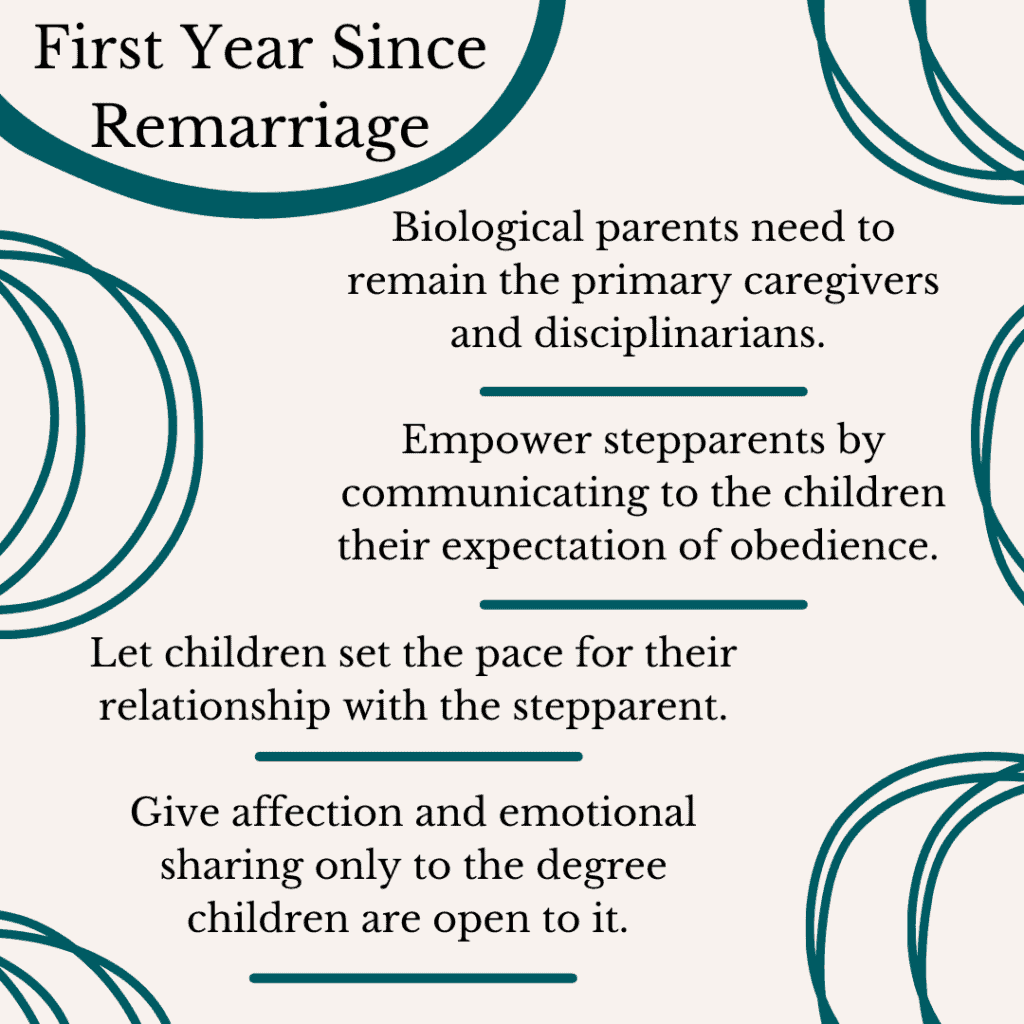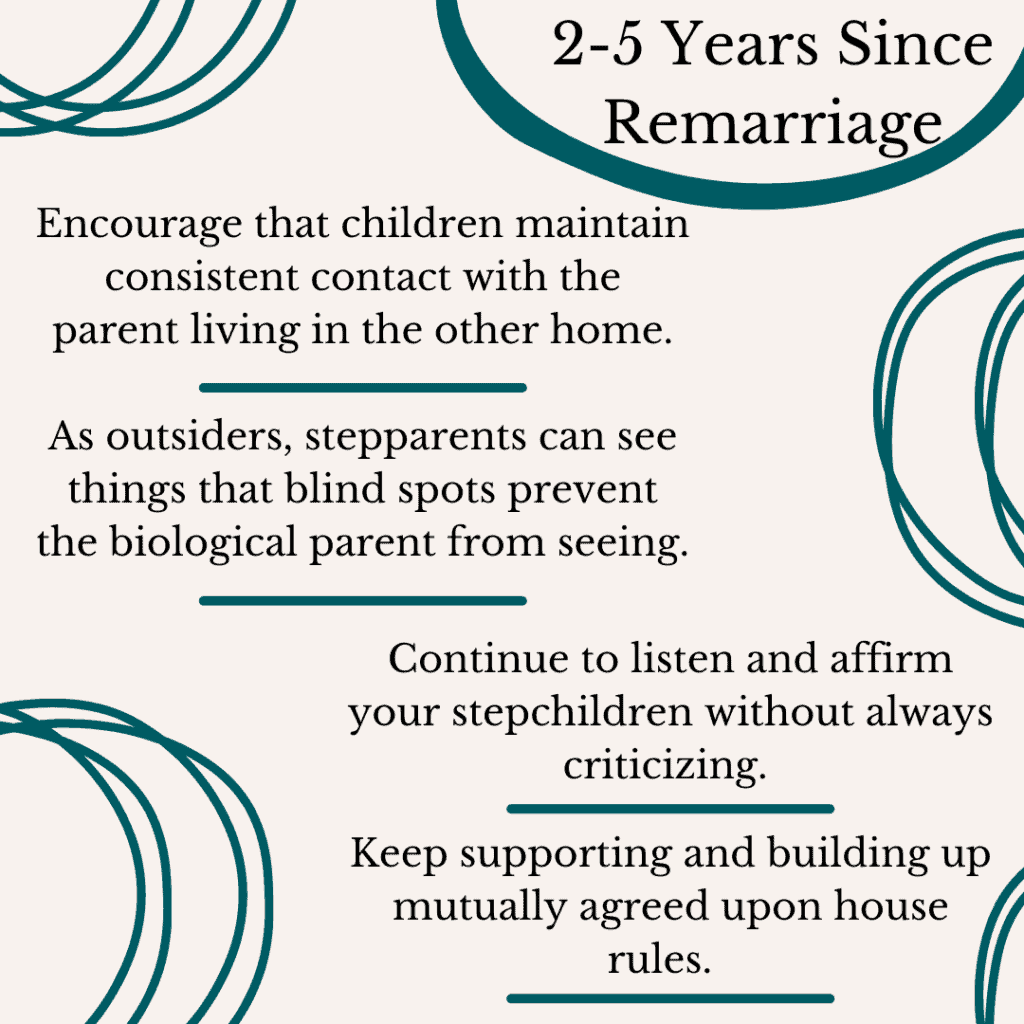
Husbands, Your Mission Should You Choose to Accept It…
As husbands, our call to adventure takes place the day we stand at the altar with our bride in front of friends and family.

Contrary to what you may think, stepparenting is a two-person task. Learn how both parents can positively shape their stepfamily’s future while also cultivating their present too.
Stepparenting changes as relationships grow.
Early in remarriage, the most successful stepparent-stepchild relationships are those where the stepparent focuses first on the development of a warm, friendly interaction style with the stepchild. Once a foundation of mutual respect and affection is established, stepparents who then attempt to assume a disciplinarian role are less likely to meet with resentment from the stepchild
Closeness and the authority to discipline develop over time, and neither should be rushed. For example, stepparents are often eager to build a relationship and commonly seek one-on-one activities with stepchildren. But for a time, stepchildren are often uncomfortable being alone with a stepparent.
The ability to lead and influence children comes the old-fashioned way — you earn it. Trust, respect and honor grow out of a relational history, and there is no quick way to establish that. Stepparents must be dedicated to building a relationship over time.
Effective stepparents gradually move into disciplinary roles. Power comes with relationship and grows over time. Let’s look at three positive relationship styles that give way to parental authority.
Baby-sitters have power to manage children only if parents give them power. When our favorite baby-sitter, Amy, comes to watch our three boys, I remind them in front of her that she is in charge while we’re away. “She knows the rules and if you disobey her, you are disobeying me. She has my permission to enforce the consequences. Plus, she’ll tell me about it later and you’ll have to deal with me, too.”
After saying this before a number of date nights, my kids now finish the sentence before me. “We know, we know. Amy’s in charge.”
After a moderate relationship has developed, stepparents can move into the “uncle or aunt” stepparenting role. If my sister comes to my house and Nan and I are away for a few hours, she carries some authority with my children simply because she’s their aunt. She is not a full-fledged parent but carries power through her extended family kinship.
Stepparents can gradually gain a basic level of respect that allows children to accept them as extended family members by marriage. Stepparents can become more authoritative: clearly communicating limits and encouraging family discussion of rules.
Furthermore, as personal bonds deepen, shows of affection and appreciation can become more common. One-on-one activities can become more frequent and personal connections increase.
Eventually, some stepparents will gain “parental” status with some stepchildren. Younger children tend to grant stepparents parental status much more quickly than adolescents.
It is quite common to be considered a baby-sitter by an older child, an aunt by a middle child, and a parent by the youngest child. These roles can be confusing so be sure you and your spouse are a solid parenting team. Discuss circumstances often and work together to make changes over time.
It is important that stepparents not consider themselves failures if they do not achieve parental status with every child. Again, the length of time required to move into this role depends on a number of factors, most of which are beyond the stepparent’s control. Enjoy the relationship you have now and trust the integration process.
Stress in a stepfamily generally divides people along biological lines. When push comes to shove, the allegiance (or loyalty) between parents and children often wins out over the marriage unless the couple can form a unified position of leadership. If they cannot govern the family as a team, the household is headed for anger, jealousy, and unacceptance.
Unity within the couple’s relationship bridges the emotional gap between the stepparent and stepchildren and positions both adults to lead the family. If a biological parent is not willing to build such a bridge with the stepparent, the stepchildren will receive an unhealthy amount of power in the home. All they have to do is cry “unfair” and their parent protects them from the “mean, nasty” stepparent. This almost always results in marital tension, conflict, resentment, and isolation.
Now let me balance this truth by noting that biological parents must take a “both/and” stance with their children and new spouse. They must invest time and energy in both. Early in the remarriage, for example, it is especially important to stay connected with your children. But eventually the marriage must be made a priority, even in front of the children.


No one in stepfamilies experiences more loss than children. This truth is difficult for most adults to recognize simply because they are consumed with their own losses. It’s human nature to notice our own wounds more than someone else’s. Yet children, because of a lack of maturity and coping skills, need more help processing their grief than adults.
The death of a parent or a parental divorce means children lose control of their lives, lose contact with parents, grandparents and siblings, and lose continuity to living arrangements and routines.

This list doesn’t begin to capture the kinds of changes (losses) forced upon children when families end and begin. And some changes have greater impact than others.
For example, couples need to realize that marriage for them is a gain, but for their children it is another loss. This important truth — that remarriage often disrupts the parent-child bond and produces insecurity in children — is not intended to make you feel guilty. If you are a parent, you need to understand the impact loss has on your children. If you are a stepparent, you need to empathize with — not resent — your stepchildren’s grief.
I believe that one of the hardest things children in stepfamilies must learn is to share a parent with a stepparent or stepsiblings. They’ve lost so much already, it’s understandable why they would resist “losing” another parent. To protect their relationships, children may push away a stepparent. This brings about competition and insecurity, especially if a stepparent takes the threat personally.
I wish I could count the number of stepparents who have described their stepchildren as “jealous” and “trying to be manipulative.” I respond with, “I know that’s what it looks like on the outside, but what they are on the inside is hurt. These children have experienced a great deal of loss in the past and that makes them scared of more hurt. One of the things they fear most is losing their parent to you. Don’t get hooked into competing for time. You’re the adult. Back away every once in a while and give them exclusive time with their parent so they don’t fear you quite so much. Someday, when they allow you in, you can share time with their parent more equitably.”
Respect and be aware of how previous losses creates fear in children.